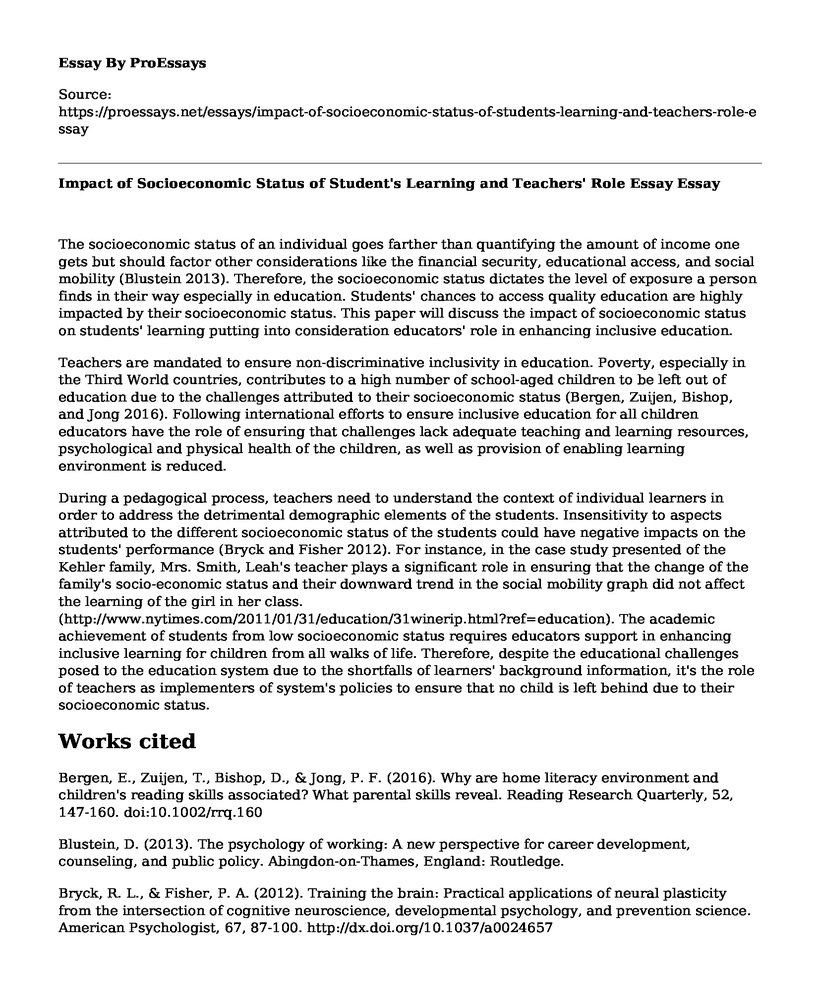The socioeconomic status of an individual goes farther than quantifying the amount of income one gets but should factor other considerations like the financial security, educational access, and social mobility (Blustein 2013). Therefore, the socioeconomic status dictates the level of exposure a person finds in their way especially in education. Students' chances to access quality education are highly impacted by their socioeconomic status. This paper will discuss the impact of socioeconomic status on students' learning putting into consideration educators' role in enhancing inclusive education.
Teachers are mandated to ensure non-discriminative inclusivity in education. Poverty, especially in the Third World countries, contributes to a high number of school-aged children to be left out of education due to the challenges attributed to their socioeconomic status (Bergen, Zuijen, Bishop, and Jong 2016). Following international efforts to ensure inclusive education for all children educators have the role of ensuring that challenges lack adequate teaching and learning resources, psychological and physical health of the children, as well as provision of enabling learning environment is reduced.
During a pedagogical process, teachers need to understand the context of individual learners in order to address the detrimental demographic elements of the students. Insensitivity to aspects attributed to the different socioeconomic status of the students could have negative impacts on the students' performance (Bryck and Fisher 2012). For instance, in the case study presented of the Kehler family, Mrs. Smith, Leah's teacher plays a significant role in ensuring that the change of the family's socio-economic status and their downward trend in the social mobility graph did not affect the learning of the girl in her class. (http://www.nytimes.com/2011/01/31/education/31winerip.html?ref=education). The academic achievement of students from low socioeconomic status requires educators support in enhancing inclusive learning for children from all walks of life. Therefore, despite the educational challenges posed to the education system due to the shortfalls of learners' background information, it's the role of teachers as implementers of system's policies to ensure that no child is left behind due to their socioeconomic status.
Works cited
Bergen, E., Zuijen, T., Bishop, D., & Jong, P. F. (2016). Why are home literacy environment and children's reading skills associated? What parental skills reveal. Reading Research Quarterly, 52, 147-160. doi:10.1002/rrq.160
Blustein, D. (2013). The psychology of working: A new perspective for career development, counseling, and public policy. Abingdon-on-Thames, England: Routledge.
Bryck, R. L., & Fisher, P. A. (2012). Training the brain: Practical applications of neural plasticity from the intersection of cognitive neuroscience, developmental psychology, and prevention science. American Psychologist, 67, 87-100. http://dx.doi.org/10.1037/a0024657
http://www.nytimes.com/2011/01/31/education/31winerip.html?ref=education
Cite this page
Impact of Socioeconomic Status of Student's Learning and Teachers' Role Essay. (2022, Jun 06). Retrieved from https://proessays.net/essays/impact-of-socioeconomic-status-of-students-learning-and-teachers-role-essay
If you are the original author of this essay and no longer wish to have it published on the ProEssays website, please click below to request its removal:
- Research Paper on Prescribed Drugs Used by Military Service Members During Vietnam War
- Expository Essay: The Elderly
- Should Countries That Fail to Protect Women's Rights Suffer International Sanctions?
- Poverty as an Economic Development Issue Paper Example
- The Syrian Refugee Crisis Essay
- Essay Example on Psychoactive Drugs: Altering Mental State & Abusing Alcohol
- Essay Example on Stonier: Setting the Pace in Executive Education since 1935







